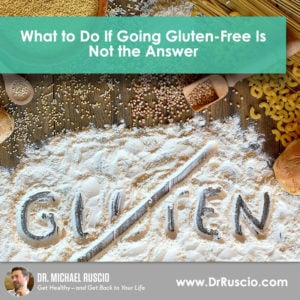What to Do If Going Gluten-Free Is Not the Answer
 While gluten-free diets are a popular treatment for some, others must do more dietary or testing interventions to get to the root cause of their issues.
While gluten-free diets are a popular treatment for some, others must do more dietary or testing interventions to get to the root cause of their issues.
- If you need help with digestion, click here.
- To be notified when my print book becomes available & get a free gut health eBook, click here.
- If you are a healthcare provider looking to sharpen your clinical skills, click here.
What to Do If Going Gluten-Free Is Not the Answer
Removing gluten from the diet has become popular among those trying to troubleshoot their digestive health problems.
Gluten is a plant protein commonly found in wheat, rye, and barley, as well as soy sauce and some processed foods. While some people feel much better from cutting out gluten, others don’t. Even in the case of celiac disease, going gluten-free doesn’t always bring total resolution of all bothersome symptoms.
What should you do if eliminating gluten does not provide the desired relief?
There are several avenues to explore if going gluten-free is not your answer.
While cutting gluten may be helpful, it may just be one piece of the puzzle. It’s important to look at the big picture by examining the bacterial balance in the gut. Dysbiosis is the term for an imbalance or overgrowth of yeast/fungus, bacteria, or other microbes in the bacterial ecosystem of the gut.
For example, if dysbiosis is caused by fungal overgrowth, removing gluten from the diet will not resolve the problem.
A recent study tested the guts of 45 celiac patients, those who have a major immune response to gluten, and 45 healthy control subjects, those who do not.
The testing revealed higher levels of yeast in the celiac group.
Both candida yeast and saccharomyces yeast were found in 33 percent of celiac stool samples, while no one in the control group had candida and only 10 percent had saccharomyces.
The study mentioned no difference in the parasites measured in both groups.
The study suggests a higher likelihood of dysbiosis and fungal overgrowth among the celiac population. It also suggests that parasites are not a significant reason that one group may be experiencing more gut complaints than the other.
It’s popular these days, on the Internet, to blame intractable, hard-to-diagnose, and treatment-resistant gut issues on parasites. The data in the study above and my clinical experience points to the fact that this view may be overstated. Bacterial or fungal dysbiosis is more commonly seen.
So why are celiac patients inclined to have higher fungal levels or other forms of dysbiosis?
My answer applies to those with both celiac and non-celiac gluten sensitivity. Non-celiac gluten sensitivity is a reaction to the gluten that doesn’t involve a full autoimmune response.
Intolerance to gluten will do the following things to the gut.
It will damage the intestines of gluten sensitive folks by weakening the immune system and causing carbohydrate malabsorption.
Gluten damages intestinal cells, which in turn damages the immune system and makes it harder for it to police and regulate proper bacterial and fungal balance.
Damaged intestinal cells will also impair the gut’s ability to produce the enzymes needed to break down carbohydrates. When carbs aren’t properly digested and absorbed, they remain in the gut to feed opportunistic bacterial and fungal populations, leading to an overgrowth.
Not just gluten, but also highly fermentable and hard-to-digest carbs can pose a threat to gut health and balance. If gluten is replaced with highly processed gluten-free grains/carbs with added sugars, it could feed dysbiosis.
Eliminating refined and artificial sweeteners, as well as processed, hard-to-digest carbohydrates is a good next step. Replace them with fresh, high quality meats, fats, veggies, and fruits. Unprocessed gluten-free grains may also be tolerated be some.
If a dietary overhaul doesn’t bring health improvement, the next step is a complete gut evaluation. Testing through saliva, blood, breath, and stool will identify fungal overgrowth, small intestinal bacterial overgrowth, or other pathogens, like H. pylori.
If your doctor doesn’t offer these tests, find a functional medicine practitioner or naturopath to run them. I offer gut testing in my clinical practice.
If going gluten-free has not worked for you, cleaning up the diet or identifying and treating dysbiosis can be the missing piece in resolving mysterious gut issues.
If you need help with digestion, click here.
To be notified when my print book becomes available & get a free gut health eBook, click here.
If you are a healthcare provider looking to sharpen your clinical skills, click here.
What do you think? I would like to hear your thoughts or experience with this.
Dr. Ruscio is your leading functional and integrative doctor specializing in gut related disorders such as SIBO, leaky gut, Celiac, IBS and in thyroid disorders such as hypothyroid and hyperthyroid. For more information on how to become a patient, please contact our office. Serving the San Francisco bay area and distance patients via phone and Skype.
Discussion
I care about answering your questions and sharing my knowledge with you. Leave a comment or connect with me on social media asking any health question you may have and I just might incorporate it into our next listener questions podcast episode just for you!